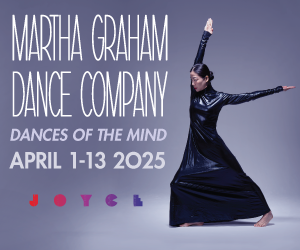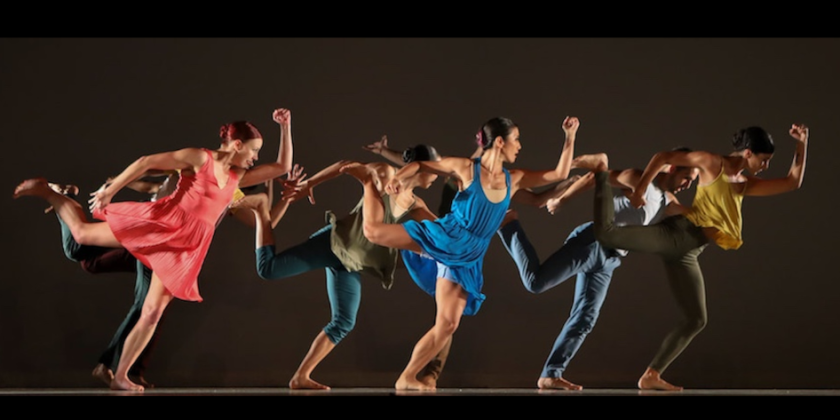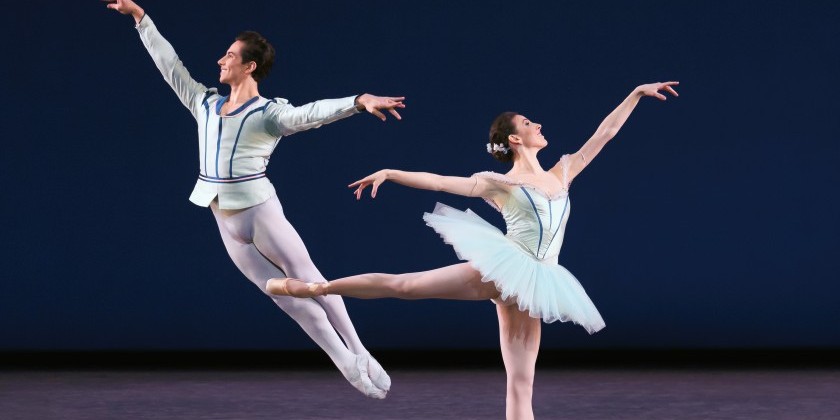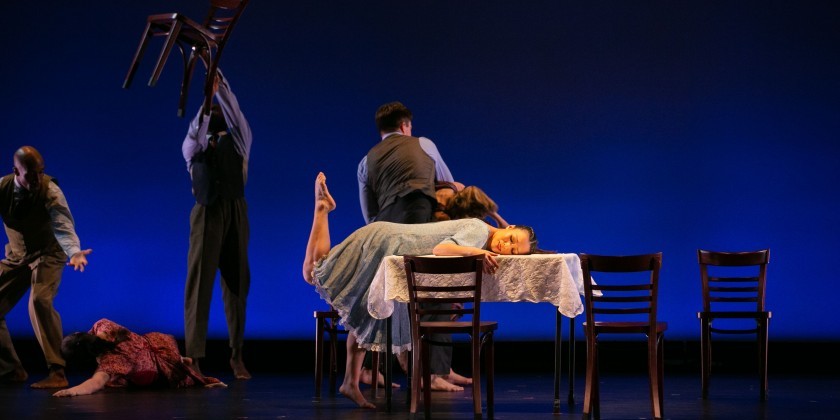IMPRESSIONS: Lar Lubovitch Dance Company, Highlights of Three Acclaimed Works in their Original Television Broadcast Premieres — Free and On Demand to View until May 31st

Duet from "Concerto Six Twenty-Two," "Othello," and "The Planets"
The free, on-demand program runs through May 31 st at 7:30 p.m. EDT. Reservations are required at www.lubovitch.org.
Lar Lubovitch’s easy-on-the-eyes choreography exemplifies mainstream modern dance in its most accessible form. His current offering, the digital “Three Dances,” appears to emphasize the diversity of his oeuvre – it draws from a modern piece, a ballet, and an ice dance. Yet what it actually reveals is how consistently rooted Lubovitch’s work is in the elements that have come to define 20th-century modern dance.
Offered free through May 31 (after registration at lubovitch.org), the 35-minute program of excerpts from televised dances Lubovitch choreographed in the 1980s and 1990s makes for diverting time-travel and reminds us of television’s key role in disseminating dance during that period. It includes the male duet from the concert-dance piece Concerto Six Twenty-Two, Act III from the ballet Othello, and the “Venus” section from the ice-dance TV special The Planets.

Created during the emergence of the AIDS crisis in the mid-1980s, the tender Concerto Six Twenty-Two duet is set to a tightly-organized Mozart concerto that provides an assuring structure for the choreography and underlines the sense of unwavering support exuded by the men’s movements. Poignantly danced in this 1988 BBC recording by its original cast, Sylvain Lafortune and Rick Michalek from Lar Lubovitch Dance Company, the work opens with the duo walking in unison – their softly bending knees, pliant feet, and slightly turned-out legs reflecting that subtle stylization of pedestrian movements characteristic of the pioneering modern dance makers.
As the choreography evolves into full-bodied movements, and the men begin to share and support each other’s weight — another defining modern dance trait — we are struck by the exquisite lyricism and fluidity of the motions, signature Lubovitch qualities. There’s not a bump, an edge, or a break in the flow as the dancers roll over a rounded back, press a hand to buttress a tilting spine, recline against a lunging leg, or gorgeously suspend a grand jeté perched atop the other’s shoulder. Through spatially compelling phrases of sustained movements, Lubovitch displays that careful choreographic crafting prized by the moderns, astutely mining changing shapes, levels, and pathways to convey a couple’s enduring emotional attachment.

Jointly produced by American Ballet Theatre, San Francisco Ballet, and LLDC in 1997, Lubovitch’s Othello employs ballet vocabulary to tell the tragic Shakespearean tale. However, this video of the final act shows that when it comes time for the dramatic climax, Lubovitch turns to a modern-dancer’s faith in the use of minimal gestures to express a maximum of emotion. (One thinks immediately of José Limón’s brilliantly spare depiction of Othello’s story in The Moor’s Pavane.) Lubovitch cleverly explores how the same movements, imbued with different energies, will communicate completely different meanings. While the villainous Iago infuriates Othello by telling him lies about his wife Desdemona’s unfaithfulness, using a gestural language that intertwines the men’s bodies, in the background we see Desdemona and Cassio acting out Iago’s falsehoods by way of the same physical lexicon -- theirs imbued with innocently sustained energies, Iago’s with disturbing ebbs and flows. Taken from a 2002 PBS Great Performances broadcast, the video is enriched by its dream cast: Desmond Richardson, at the height of his physical prowess, dancing Othello; Parrish Maynard in an outstanding portrayal of Iago; the ethereal Yuan Yuan Tan performing Desdemona; and, as Cassio, a young Gonzalo Garcia who, today a New York City Ballet principal, was then a San Francisco Ballet member.

Initially, some may question the aesthetic wisdom of marrying ice skating and modern dance, and may be put off by the arty Greek-goddess concept underpinning the excerpt from The Planets. Yet the inherent flow of Lubovitch’s choreography makes the addition of skating’s gliding effect feel like a natural extension of the dancing, exuding that organic quality so valued by the moderns. Set to dreamy music by Gustav Holst, and featuring soloist Sonia Rodriguez from National Ballet of Canada, 1992 Olympic Silver Medalists in Ice Dancing Paul and Isabelle Duchesnay, and an ensemble of skaters assembled especially for this 1994 Canadian television production, the work excites and enchants.
What a thrill ride it must have been for Rodriguez, with Paul Duchesnay charging full-speed around the rink lifting her overhead and manipulating her body into ever-changing forms. Ensuring her ballet-slippered feet never touch the ice, he then steadies her — as she assumes a softly-formed arabesque position balanced upon the instep of one of his skates — and slides her safely back to her “earthly” home at the end of the ice. A tranquil ending to a stimulating, retrospective stroll through Lubovitch’s thoroughly modern oeuvre.














